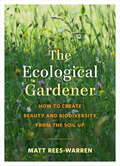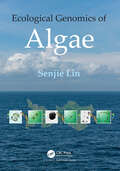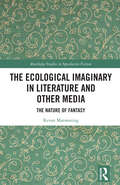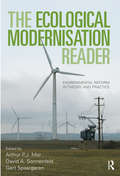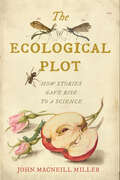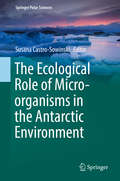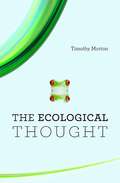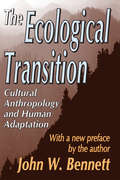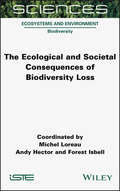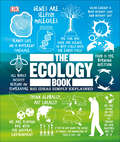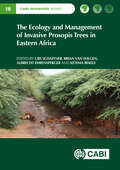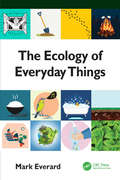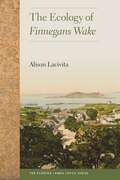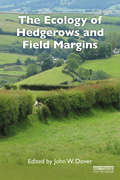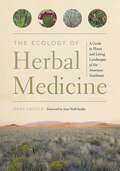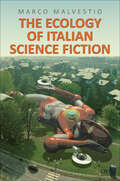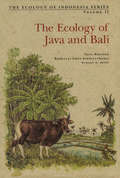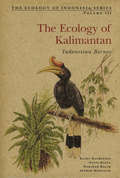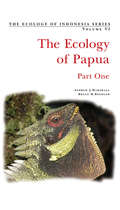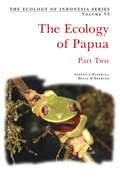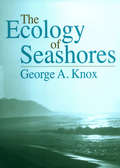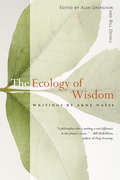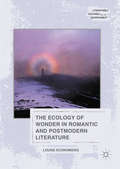- Table View
- List View
The Ecological Gardener: How to Create Beauty and Biodiversity from the Soil Up
by Matt Rees-WarrenDesign a garden for the future—because what we grow matters."Matt Rees-Warren explains why every square inch of Earth, including our gardens, has ecological significance... Excellent, timely, essential!" —Douglas W. Tallamy, author of Nature&’s Best HopeTransform your garden into a self-sustaining haven for nature and wildlife. Ecological garden designer Matt Rees-Warren shares inspirational design ideas and practical projects to help you create a garden that is both beautiful today and sustainable tomorrow.The Ecological Gardener will give you the tools to create an abundant, healthy garden from the soil up—a garden that welcomes birds and bees and allows native planting and wild flowers to flourish, with minimal carbon impact or need for fresh water. This book can guide both novice and experienced gardeners alike in their journey to a more ecological approach, and is full of practical projects and information, including: • Finding the right design for your space• Creating a wildflower meadow• Building rainwater catchments and other tips for water conservation• Making compost from kitchen waste, leaf mold, compost tea and more• Creating a space for wildlife such as hedgehogs, bees and other pollinators• Finding beauty in your garden during the winterMatt will show you how to re-imagine how you garden, working with nature instead of controlling it, to create a space that promotes both wildlife and beauty.
The Ecological Genomics of Algae
by Senjie LinDiscover the captivating world of algae through the lens of genomics in Ecological Genomics of Algae. This comprehensive resource explores the evolutionary, ecological, and molecular foundations of algal biology. Spanning 21 chapters, it delves into genome evolution, environmental adaptation, energy acquisition, nutrient uptake, environmental sensing and signal transduction, stress responses, defense, and algae-microbe interactions. From unicellular forms to complex seaweeds, this book illuminates how algae navigate their environments and adapt to climate change. Ideal for researchers and students, it provides cutting-edge insights into the genomic mechanisms driving one of nature's most versatile and essential groups of organisms.
The Ecological Imaginary in Literature and Other Media: The Nature of Fantasy (Routledge Studies in Speculative Fiction)
by Kevan ManwaringFrom Gilgamesh to Gawain and the Green Knight, the Brothers Grimm to Grimdark, the natural world has provided the backdrop for Fantasy since its earliest iterations. The playgrounds of childhood are often a writer’s first Fantasy landscape and can develop into fully fledged storyworlds. Do readers of Fantasy seek out the genre for a taste of this unsullied environment? Is it nostalgia for the lost Edens of childhood, a way to escape, or to find resilience and inspiration? And in a time of Climate Emergency, is the nature of Fantasy changing to reflect the challenges it presents? Can the blue-sky thinking of the Fantastic provide us with a useful tool for addressing what the United Nations has called ‘the defining crisis of our time’? This is a timely survey of the environmental aspects of Fantasy, with a unique focus on Fantasy sites and the real-world impact of Fantasy texts across media.
The Ecological Modernisation Reader: Environmental Reform in Theory and Practice
by Arthur P.J. MolStructural environmental reform by firms and industries, governmental and intergovernmental agencies, non-governmental organisations (NGOs), and others is a worldwide phenomenon and the focus of this definitive collection. Includes a comprehensive introduction to and overview of Ecological Modernisation Theory; original, state-of-the-art review essays by distinguished international scholars; a selection of the best published works and debates from a quarter-century of related social science scholarship; an emphasis on environmental issues in Asian and other emerging economies; and an agenda for continued scholarship, policymaking, and practice. Accessible to students, policymakers, professionals, executives, and others interested in deeply understanding contemporary environmental issues and taking effective action for environmental solutions. Rigorous and sophisticated for use in graduate and advanced studies. Appropriate for courses in Sociology, Political Science, Policy Studies, Geography, Environmental Studies, Environmental Planning, Business, Economics, Asian Studies, Development Studies, and other fields.
The Ecological Plot: How Stories Gave Rise to a Science (Under the Sign of Nature)
by John MacNeill MillerUnraveling the surprising history of the concept of ecologyThe Ecological Plot traces the roots of this most mainstream branch of science back to an unexpected source: narrative storytelling. Weaving together the histories of different disciplines, John MacNeill Miller shows how pioneering thinkers drew on a shared set of literary techniques to imagine how different species could work together as a single, interdependent community, redefining the way we conceptualize the natural world. Beginning with a series of revolutionary exchanges between the political economist Thomas Robert Malthus, the writer Harriet Martineau, and the naturalist Charles Darwin, The Ecological Plot identifies the foundations of modern notions of ecology, economics, and realist fiction, maps how they evolved through the works of Victorian writers such as Elizabeth Gaskell, George Eliot, and Thomas Hardy, and shows how they resurfaced in the works of Aldo Leopold and Rachel Carson a century later. Miller&’s book reveals why our most sophisticated efforts to explain humanity&’s relationship to nature have been segregated into different disciplines and makes an argument for the importance of bringing these separate ways of understanding the world back together as a crucial step toward solving the environmental, economic, and ethical problems of the present.
The Ecological Role of Micro-organisms in the Antarctic Environment (Springer Polar Sciences)
by Susana Castro-SowinskiThis book provides up-to-date multidisciplinary information regarding microbial physiological groups in terms of their role in the Antarctic ecology. How do microorganisms shape the Antarctic environment? The book presents a thorough overview of the most important physiological microbial groups or microbial systems that shape the Antarctic environment. Each microbial model is described in terms of their physiology and metabolism, and their role in the Antarctic environmental sustainability. The individual chapters prepare readers for understanding the relevance of the microbial models from both an historical perspective, and considering the latest developments. This book will appeal to researchers and teachers interested in the Antarctic science, but also to students who want to understand the role of microbes in the ecology of extreme environments.
The Ecological Thought
by Timothy MortonIn this passionate, lucid, and surprising book, Timothy Morton argues that all forms of life are connected in a vast, entangling mesh. This interconnectedness penetrates all dimensions of life. No being, construct, or object can exist independently from the ecological entanglement, Morton contends, nor does “Nature” exist as an entity separate from the uglier or more synthetic elements of life. Realizing this interconnectedness is what Morton calls the ecological thought.<P> In three concise chapters, Morton investigates the profound philosophical, political, and aesthetic implications of the fact that all life forms are interconnected. As a work of environmental philosophy and theory, The Ecological Thought explores an emerging awareness of ecological reality in an age of global warming. Using Darwin and contemporary discoveries in life sciences as root texts, Morton describes a mesh of deeply interconnected life forms—intimate, strange, and lacking fixed identity.<P> A “prequel” to his Ecology without Nature: Rethinking Environmental Aesthetics (Harvard, 2007), The Ecological Thought is an engaged and accessible work that will challenge the thinking of readers in disciplines ranging from critical theory to Romanticism to cultural geography.
The Ecological Transition: Cultural Anthropology and Human Adaptation
by John W. BennettWritten during the height of the ecology movement, The Ecological Transition is a stunning interdisciplinary work. It combines anthropology, ecology, and sociology to formulate an understanding of cultural-environmental relationships. While anthropologists have been studying relationships between humans and the physical environment for a very long time, only in the last thirty years have questions inherent in these relationships broadened beyond description and classification. For example, the concept of environment has been extended beyond the physical into the social.Although anthropologists have adopted many of the concepts that Bennett develops in the book, he also feels that the central issues have never been addressed, either by anthropologists or by people in related disciplines. The most important of these, in Bennett's opinion, is the failure to incorporate a respect for the environmental in contemporary culture, which would allow making exceptions in certain human practices in order to protect the environment. His point in The Ecological Transition is that a basic cultural change in modern civilization is necessary to achieve this end.Both a theoretical and a practical work, The Ecological Transition emphasizes the relationships between human culture, the physical environment, technology, and social policy. The Ecological Transition is a challenging volume that makes us face the consequences of human behavior in the modern world: its effect on pollution, natural resources, agriculture, the economy, and population, to name just a few areas. The book remains a significant contribution to the discourse on social, economic, and environmental problems. While the book was first published in 1976, it still reads as a contemporary tract.
The Ecological and Societal Consequences of Biodiversity Loss
by Michel Loreau Andy Hector Forest IsbellThe idea that changes in biodiversity can impact how ecosystems function has, over the last quarter century, gone from being a controversial notion to an accepted part of science and policy. As the field matures, it is high time to review progress, explore the links between this new research area and fundamental ecological concepts, and look ahead to the implementation of this knowledge.This book is designed to both provide an up-to-date overview of research in the area and to serve as a useful textbook for those studying the relationship between biodiversity and the functioning, stability and services of ecosystems. The Ecological and Societal Consequences of Biodiversity Loss is aimed at a wide audience of upper undergraduate students, postgraduate students, and academic and research staff.
The Ecology Book: Big Ideas Simply Explained (DK Big Ideas)
by DKLearn about species, environments, ecosystems and biodiversity in The Ecology Book.Part of the fascinating Big Ideas series, this book tackles tricky topics and themes in a simple and easy to follow format. Learn about Ecology in this overview guide to the subject, great for novices looking to find out more and experts wishing to refresh their knowledge alike! The Ecology Book brings a fresh and vibrant take on the topic through eye-catching graphics and diagrams to immerse yourself in. This captivating book will broaden your understanding of Ecology, with:- More than 90 of the greatest ideas in ecology- Packed with facts, charts, timelines and graphs to help explain core concepts- A visual approach to big subjects with striking illustrations and graphics throughout- Easy to follow text makes topics accessible for people at any level of understandingThe Ecology Book is a captivating introduction to what&’s happening on our planet with the environment and climate change, aimed at adults with an interest in the subject and students wanting to gain more of an overview. Here you&’ll discover more than 90 of the greatest ideas when it comes to understanding the living world and how it works, through exciting text and bold graphics.Your Ecological Questions, Simply ExplainedHow do species interact with each other and their environment? How do ecosystems change? What is biodiversity and can we afford to damage it? This fresh new guide looks at our influence on the planet as it grows, and answers these profound questions. If you thought it was difficult to learn about this field of science, The Ecology Book presents the information in a clear layout. Learn the key theories, movements, and events in biology, geology, geography, and environmentalism from the ideas of classical thinkers in this comprehensive guide.The Big Ideas SeriesWith millions of copies sold worldwide, The Ecology Book is part of the award-winning Big Ideas series from DK. The series uses striking graphics along with engaging writing, making big topics easy to understand.
The Ecology and Management of Invasive Prosopis Trees in Eastern Africa (CABI Invasives Series)
by Urs Schaffner, Brian W. van Wilgen, Albrecht Ehrensperger & Ketema BekeleThis book synthesises information on an important environmental problem - the invasion of natural ecosystems in Africa by alien Prosopis trees, and how they should be managed. It addresses how the problem came about, what we know about how it works, and how it can potentially be managed at different scales. The book has a focus on eastern Africa but includes studies from elsewhere. Prosopis trees were originally introduced to Africa as early as 1880 (in South Africa), and later to eastern Africa in 1917 (in Sudan). They are difficult to manage due to their ecological features, such as their ability to produce copious amounts of seed, and to compete successfully with native species for resources, but also because they have both beneficial uses and negative impacts, making them conflict species, where people disagree on goals for management and how they should be achieved. In eastern Africa, Prosopis juliflora invades rangeland, cropland, settlements and riparian ecosystems, causing negative impacts on biodiversity and ecosystem services that rural communities depend on. This book considers the perceptions and conflicting interests of different stakeholder groups, and how engagement can be used to co-design management strategies and implement concrete control measures. The book is therefore not only of interest to those working with this invasive tree species, but also to persons involved in policy development and management of other invasive species, or in the wider field of sustainable environmental management.
The Ecology of Everyday Things
by Mark EverardNature is all around us, in the beautiful but also in the unappealing and functional, and from the awe-inspiring to the mundane. It is vital that we learn to see the agency of the natural world in all things that make our lives possible, comfortable and profitable. The Ecology of Everyday Things pulls back the veil of our familiarity on a range of ‘everyday things’ that surround us, and which we perhaps take too much for granted. This key into the magic world of the everyday can enable us to take better account of our common natural inheritance. Professor James Longhurst, Assistant Vice Chancellor, University of the West of England (UWE Bristol) For many people, ecosystems may be a remote concept, yet we eat, drink, breathe and interface with them in every moment of our lives. In this engaging textbook, ecosystems scientist Dr. Mark Everard considers a diversity of ‘everyday things’, including fascinating facts about their ecological origins: from the tea we drink, to the things we wear, read and enjoy, to the ecology of communities and space flight, and the important roles played by germs and ‘unappealing creatures’ such as slugs and wasps. In today’s society, we are so umbilically connected to ecosystems that we fail to notice them, and this oversight blinds us to the unsustainability of everyday life and the industries and policy environment that supports it. The Ecology of Everyday Things takes the reader on an enlightening, fascinating voyage of discovery, all the while soundly rooted in robust science. It will stimulate awareness about how connected we all are to the natural world and its processes, and how important it is to learn to better treat our environment. Ideal for use in undergraduate- and school-level teaching, it will also interest, educate, engage and enthuse a wide range of less technical audiences.
The Ecology of Finnegans Wake (Florida James Joyce)
by Alison LacivitaIn this book—one of the first ecocritical explorations of Irish literature—Alison Lacivita defies the popular view of James Joyce as a thoroughly urban writer by bringing to light his consistent engagement with nature. Using genetic criticism to investigate Joyce’s source texts, notebooks, and proofs, Lacivita shows how Joyce developed ecological themes in Finnegans Wake over successive drafts.Making apparent a love of growing things and a lively connection with the natural world across his texts, Lacivita’s approach reveals Joyce’s keen attention to the Irish landscape, meteorology, urban planning, Dublin’s ecology, the exploitation of nature, and fertility and reproduction. Alison Lacivita unearths a vital quality of Joyce’s work that has largely gone undetected, decisively aligning ecocriticism with both modernism and Irish studies.
The Ecology of Hedgerows and Field Margins
by John W. DoverHedges and field margins are important wildlife habitats and deliver a range of ecosystem services, and their value is increasingly recognised by ecologists. This book reviews and assesses the current state of research on hedgerows and associated field margins. With the intensification of agriculture in the second half of the last century, field sizes were increased by amalgamation and the rooting out of hedges, synthetic pesticide and inorganic fertiliser use increased, and traditional methods of hedge management were largely abandoned. The book is split into two main sections. The first deals with definitions, current and historic management, the impact of pesticides, the decline in hedge stock and condition, and new approaches to hedge evaluation using remote sensing techniques. The second section explores the pollination and biological pest control benefits provided by hedges and field margins and examines the ecology of some of the major groups that are found in hedgerows and field margins: butterflies and moths, carabid beetles, mammals, and birds. A case study on birds and invertebrates from a research farm managed as a commercial enterprise, but which attempts to farm with wildlife in mind, brings these themes together. A final chapter introduces the neglected area of hedges in the urban environment. The book will be of great interest to advanced students, researchers and professionals in ecology, agriculture, wildlife conservation, natural history, landscape, environmental and land management.
The Ecology of Herbal Medicine: A Guide to Plants and Living Landscapes of the American Southwest
by Dara SavilleThe Ecology of Herbal Medicine introduces botanical medicine through an in-depth exploration of the land, presenting a unique guide to plants found across the American Southwest. An accomplished herbalist and geographer, Dara Saville offers readers an ecological manual for developing relationships with the land and plants in a new theoretical approach to using herbal medicines.Designed to increase our understanding of plants&’ rapport with their environment, this trailblazing herbal speaks to our innate connection to place and provides a pathway to understanding the medicinal properties of plants through their ecological relationships. With thirty-nine plant profiles and detailed color photographs, Saville provides an extensive materia medica in which she offers practical tools and information alongside inspiration for working with plants in a way that restores our connection to the natural world.
The Ecology of Italian Science Fiction (Toronto Italian Studies)
by Marco MalvestioThe Ecology of Italian Science Fiction investigates the representation of ecological issues in Italian science fiction and film from the 1950s to the present. Taking into account a previously understudied corpus, the book reveals how Italian science fiction has consistently been able to conceptualize and dramatize the impact of human activities on the health of planetary ecosystems and addresses the radical environmental changes that have occurred in the country since the Second World War. Moving from current debates on the environmental humanities and on the cultural status of speculative fiction, the book provides an in-depth analysis of the evolution of the genre in Italy in relationship to the country’s environmental history. The book highlights the ways in which Italian science fiction represents non-human agencies – animal, vegetal, mineral – and how the recent Solarpunk movement imagines new synergies with the environment. Drawing on notable works ranging from Lino Aldani to Gilda Musa, from Francesco Verso to Paolo Zardi, from Nicoletta Vallorani to Laura Pugno, The Ecology of Italian Science Fiction covers topics as diverse as the evolution of petroculture in Italy, environmental justice and migrations, encounters with animal and vegetal alterity, ecofeminist stances, and new dreams of sustainability.
The Ecology of Java and Bali
by Roehayat Emon Soeriaatmadja Suraya A. Afiff Tony WhittenJava and Bali are biologically and culturally diverse, and to present the background relevant to their ecological management, this book is divided into five parts:* ECOLOGICAL COMPONENTS* ECOSYSTEMS* CONSERVATION* FINDING A PATH FOR THE FUTURE
The Ecology of Java and Bali
by Roehayat Emon Soeriaatmadja Suraya A. Afiff Tony WhittenThe Ecology of Java and Bali distills for the first time the information found in nearly 3,000 scholarly works relevant to an understanding of the full range of natural and man-made ecosystems on these islands--many of them available only in Dutch, German or Indonesian. It also contains the results of original research, interviews and personal experience. It will be useful to resource managers, ecologists and government planners, as well as to all others interested in the region.Java and Bali are the best known of all the islands in the Indonesian archipelago. Nowhere else in the country are ecological issues of such importance, and nowhere else is there a better chance of the major development problems being solved. This is because Java has the greatest concentration of development projects, the densest population, excellent human resources, and the interest of many of the most powerful decision makers. Bali, meanwhile, has the eyes of the world on it as an important tourist destination enjoyed by both domestic and foreign visitors.
The Ecology of Kalimantan
by Arthur Mangalik Kathy Mackinnon Hakimah Halim Gusti HattaThis Iong-awaited book distills for the first time the information found in many thousands of scholarly documents relevant to an understanding of the full range of natural and man-made ecosystems on the island--many of them available up to now only in Dutch, German or Indonesian. This book presents a complete summary of our current scientific knowledge about Borneo including the rainforest and riverine habitats that are endangered by logging and industrial development, along with a discussion of land use patterns and current problems.Kalimantan is the Indonesian portion of the huge island of Borneo. Kalimantan has played a key role in Indonesia's economic development and is a major earner of foreign revenue due to the island's rich natural resources: forests, oil, gas, coal, and other minerals. In this book the authors argue that Kalimantan can be developed, but within tight ecological constraints and with great care. This book remains a standard reference for scientists, anthropologists, writers, and anyone interested in the region.
The Ecology of Kalimantan
by Arthur Mangalik Kathy Mackinnon Hakimah Halim Gusti HattaThis Iong-awaited book distills for the first time the information found in many thousands of scholarly documents relevant to an understanding of the full range of natural and man-made ecosystems on the island--many of them available up to now only in Dutch, German or Indonesian. This book presents a complete summary of our current scientific knowledge about Borneo including the rainforest and riverine habitats that are endangered by logging and industrial development, along with a discussion of land use patterns and current problems.Kalimantan is the Indonesian portion of the huge island of Borneo. Kalimantan has played a key role in Indonesia's economic development and is a major earner of foreign revenue due to the island's rich natural resources: forests, oil, gas, coal, and other minerals. In this book the authors argue that Kalimantan can be developed, but within tight ecological constraints and with great care. This book remains a standard reference for scientists, anthropologists, writers, and anyone interested in the region.
The Ecology of Papua: Part One
by Bruce M. Beehler Andrew J. MarshallThe Ecology of Papua brings together 76 authors to catalog for the first time the many facets of Papua's environment. Designed for students of conservation, environmental workers, and academic researchers, it is a richly detailed text, dense with biogeographical data, historical reference, and fresh insight on this complicated and marvelous region. We hope it will serve to raise awareness of Papua on a global as well as local scale, and to catalyze effective conservation of its most precious natural assets.New Guinea is the largest and highest tropical island, and one of the last great wilderness areas remaining on Earth. Papua is noteworthy for its equatorial glaciers, its vast forested floodplains, its imposing central mountain range, its Raja Ampat Archipelago, and its several hundred traditional forest-dwelling societies. Papua remains inadequately studied and largely pristine. One of the wildest places left in the world, Papua possesses extraordinary biological and cultural diversity. Today, Papua's environment is under threat from growing outside pressures to exploit its expansive forests and to develop large plantations of oil palm and biofuels. It is important that Papua's leadership balance economic development with good resource management, to ensure the long-term well-being of its culturally diverse populace.
The Ecology of Papua: Part Two
by Bruce M. Beehler Andrew J. MarshallThe Ecology of Papua brings together 76 authors to catalog for the first time the many facets of Papua's environment. Designed for students of conservation, environmental workers, and academic researchers, it is a richly detailed text, dense with biogeographical data, historical reference, and fresh insight on this complicated and marvelous region. We hope it will serve to raise awareness of Papua on a global as well as local scale, and to catalyze effective conservation of its most precious natural assets.New Guinea is the largest and highest tropical island, and one of the last great wilderness areas remaining on Earth. Papua is noteworthy for its equatorial glaciers, its vast forested floodplains, its imposing central mountain range, its Raja Ampat Archipelago, and its several hundred traditional forest-dwelling societies. Papua remains inadequately studied and largely pristine. One of the wildest places left in the world, Papua possesses extraordinary biological and cultural diversity. Today, Papua's environment is under threat from growing outside pressures to exploit its expansive forests and to develop large plantations of oil palm and biofuels. It is important that Papua's leadership balance economic development with good resource management, to ensure the long-term well-being of its culturally diverse populace.
The Ecology of Seashores (CRC Marine Science)
by George A. KnoxThe Ecology of Seashores explores the complex shore environment. It covers the ways in which representative species have adapted to life in a constantly changing environment in terms of their interactions, the control of community structure, and how energy and materials are cycled in different ecosystems.Written by an eminent marine biologist,
The Ecology of Wisdom: Writings by Arne Naess
by Arne Naess Bill Devall Alan DrengsonA founder of the Deep Ecology Movement, Arne Naess' has produced articles on environmentalism that have provided unmatched inspiration for ecologists, philosophers, and activists worldwide. This collection amasses a definitive group of Naess' most important works in which he calls for nonviolent, cooperative action to protect the Earth. Rich with observations, insights, and anecdotes, Naess' writings draw from Eastern religious practices, Gandhian nonviolent direct action, and Spinozan unity systems. Playful and compassionate in tone, Ecology of Wisdom showcases Naess' exceptional enthusiasm, wit, and spiritual fascination with nature, while educating each of us about the steps we must take to rescue the planet and illuminating the relevance of this important environmental advocate.
The Ecology of Wonder in Romantic and Postmodern Literature
by Louise EconomidesThis book traces the aesthetic of wonder from the romanticperiod through contemporary philosophy and literature, arguing for itsrelevance to ecological consciousness. Most ecocritical scholarship tends toovershadow discussions of wonder with the sublime, failing to treat these twoaesthetic categories as distinct. As a result, contemporary scholarship hasconflated wonder and the sublime and ultimately lost the nuances that these twoconcepts conjure for readers and thinkers. Economides illuminates importantdifferences between these aesthetics, particularly their negotiation of issuesrelevant to gender-based and environmental politics. In turn, readers canutilize the concept of wonder as an open-ended, non-violent framework incontrast to the ethos of domination that often surrounds the sublime.
